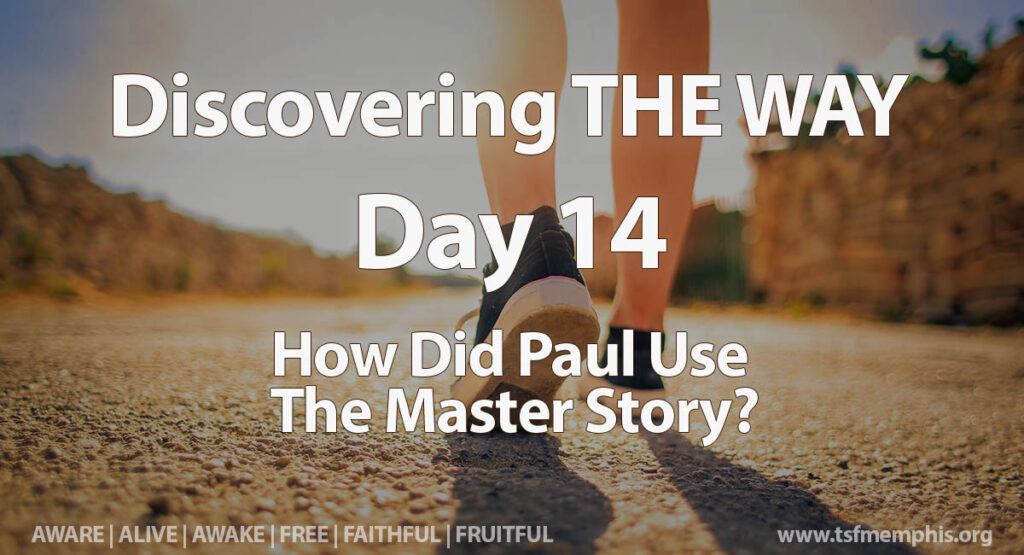Day 014: How Did Paul Use The Master Story?

We all have questions about life that we need to have answered: Who are we? Where have we come from? Why are we here? How will our lives turn out? This week, we are going to consider the basic answers that the Bible gives to these foundational questions and how Jesus plays a central role in each of these answers.
Today, we will read a message that Paul gave in Athens Greece in the First Century. We will simply read through the message and give you a few questions to ponder about the text. Tomorrow, we will return to this passage with some analysis and explanation.
Paul was an Apostle—a representative of Jesus and His Message. But Paul did not begin as “Paul.” He began as Saul, a rabbi in training who was violently opposed to The Way—the name given to the followers of Jesus in the early days (see Acts 9:2). Saul believed that Jesus and The Way were bringing shame to God’s name. Jesus, however, had other plans for him.
The Lord Jesus appeared to Saul and set him on a new a course—a new way. Saul changed his name to Paul as he became Jesus’ key representative to the Greek people of the First Century. He was “hand-picked” by Jesus Christ to carry His Good News—The Gospel— to those who had not yet heard it.
In the passage that we will read today, Paul is carrying out his mission, taking The Gospel of Jesus into new places. When he came to the ancient city of Athens, Paul became very troubled because he saw all of the idolatry (worshipping false or counterfeit gods rather than the One True God) that was present in the city (Acts 17:16). Why would Paul be upset by this? Read the following passage and think about the questions as you go along.
Acts 17:16–34
While Paul was waiting for them in Athens, his spirit was troubled within him when he saw that the city was full of idols. 17:17 So he reasoned in the synagogue with the Jews and with those who worshiped God and in the marketplace every day with those who happened to be there. 17:18 Then also, some of the Epicurean and Stoic philosophers argued with him. Some said, “What is this pseudo-intellectual trying to say?” Others replied, “He seems to be a preacher of foreign deities”—because he was telling the good news about Jesus and the Resurrection.
If you were to ask the different groups mentioned in this passage, “What is the meaning of life?” do you think they would all give the same answer? Why or Why not?
Acts 17:19
They took him and brought him to the Areopagus, and said, “May we learn about this new teaching you’re speaking of? 17:20 For what you say sounds strange to us, and we want to know what these ideas mean.” 17:21 Now all the Athenians and the foreigners residing there spent their time on nothing else but telling or hearing something new.
*The Aeropagus—sometimes called “Mars Hill”—was a long established council which considered civic issues, especially in matters of religion and morality.
What did the Athenians think about Paul’s teaching at this point?
Acts 17:22
Then Paul stood in the middle of the Areopagus and said: “Men of Athens! I see that you are extremely religious in every respect. 17:23 For as I was passing through and observing the objects of your worship, I even found an altar on which was inscribed: TO AN UNKNOWN GOD. Therefore, what you worship in ignorance, this I proclaim to you.
Why do you think Paul begins this way?
Acts 17:24
The God who made the world and everything in it—He is Lord of heaven and earth and does not live in shrines made by hands. 17:25 Neither is He served by human hands, as though He needed anything, since He Himself gives everyone life and breath and all things.
How does what Paul say here help us understand what he thinks about reality?
Acts 17:26
From one man He has made every nationality to live over the whole earth and has determined their appointed times and the boundaries of where they live. 17:27 He did this so they might seek God, and perhaps they might reach out and find Him, though He is not far from each one of us…
How does Paul answer the question, “Where did we all come from?”
Who is the “one man” Paul talks about here?
Acts 17:28
For in Him we live and move and exist, as even some of your own poets have said, ‘For we are also His offspring.’ 17:29 Being God’s offspring then, we shouldn’t think that the divine nature is like gold or silver or stone, an image fashioned by human art and imagination.
Why do you think Paul quotes Greek poets here?
Acts 17:30
“Therefore, having overlooked the times of ignorance, God now commands all people everywhere to repent, 17:31 because He has set a day when He is going to judge the world in righteousness by the Man He has appointed. He has provided proof of this to everyone by raising Him from the dead.”
How does Paul answer the question, “Where is history headed?”
Who do you think “the Man He has appointed” is?
Acts 17:32
When they heard about the resurrection of the dead, some began to ridicule him. But others said, “We’d like to hear from you again about this.” 17:33 Then Paul left their presence. 17:34 However, some men joined him and believed, including Dionysius the Areopagite, a woman named Damaris, and others with them.
How does the reaction of the crowd reveal what they thought about Paul’s teaching?
*You can find a complete list of all the MilktoMeat readings here.
